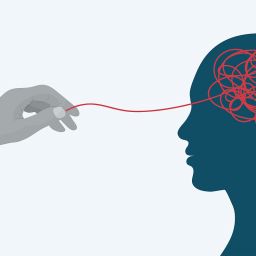
Mind-Blowing Benefits of Integrative Psychiatry for Anxiety and Depression
Feeling overwhelmed by anxiety or depression can be an isolating and challenging experience. Often, traditional psychiatric approaches focus primarily on symptom management with medication, which may not always address the root causes of mental health issues. Integrative psychiatry for anxiety and depression offers a comprehensive approach that goes beyond conventional treatments, aiming to improve overall mental health by addressing biological, psychological, social, and spiritual aspects of well-being. This blog explores six remarkable benefits of integrative psychiatry for anxiety and depression and how it can revolutionize your path to mental wellness.
The Anxiety and Depression Link
Anxiety and depression have become alarmingly prevalent issues in recent years, with many individuals experiencing these mental health challenges. Understanding the link between anxiety and depression, identifying who is at risk, and examining recent statistics can shed light on why these conditions have surged and how we can address them more effectively.
The Link Between Anxiety and Depression
Anxiety and depression are closely related mental health conditions that often coexist. The interplay between the two can create a challenging cycle where symptoms of one condition exacerbate the other. For instance, individuals with chronic anxiety may develop depressive symptoms as a result of prolonged stress and emotional exhaustion. Conversely, those with depression may experience heightened anxiety due to persistent feelings of hopelessness and helplessness.
The overlap between anxiety and depression is significant, with both conditions sharing common risk factors and symptoms. These include difficulties with sleep, concentration issues, and a general sense of unease or sadness. The mutual impact of these conditions often complicates diagnosis and treatment, making it essential for mental health professionals to adopt a comprehensive approach to care.
Who Is at Risk?
- Adolescents: Young people have been significantly affected by mental health issues, particularly during the pandemic. Adolescent females, in particular, have reported heightened levels of hopelessness and sadness compared to their male peers. According to recent data, 57% of adolescent females felt hopeless or sad in 2021, compared to 29% of males. Additionally, 30% of adolescent females considered suicide seriously, compared to 14% of adolescent males.
- Young Adults: The increase in drug overdose deaths among young people is a grave concern. Although substance use among adolescents has decreased, drug overdose deaths have soared, largely due to substances laced with synthetic opioids like fentanyl. In 2021, drug overdose deaths among adolescents more than doubled from 282 in 2019 to 637. Male, Black, and Hispanic youth have seen the highest increases in overdose deaths.
- General Population: Mental health struggles are not limited to any one group. Nearly 4 in 10 adults (39.3%) reported symptoms of anxiety or depression in February 2021, a figure that decreased to 32.3% by 2023. A KFF/CNN survey from October 2022 found that 90% of the public believes there is a mental health crisis in the U.S., underscoring the widespread nature of these issues. Source.
Why Are the Numbers Rising?
Several factors contribute to the rising prevalence of anxiety and depression:
- Pandemic Impact: The COVID-19 pandemic has had a profound effect on mental health. The isolation, uncertainty, and economic stressors associated with the pandemic have exacerbated feelings of anxiety and depression. This has been particularly pronounced among adolescents and young adults, who face unique challenges during this period.
- Substance Use and Overdose: The surge in drug overdose deaths, especially those involving synthetic opioids, reflects a broader crisis in substance abuse. The increase in fentanyl-laced substances has led to a dramatic rise in overdose deaths, with young people being disproportionately affected.
- Socioeconomic Factors: Economic hardship, job loss, and social instability have intensified mental health issues. These factors contribute to increased stress and can exacerbate existing mental health conditions.
- Increased Awareness and Reporting: Greater awareness and reduced stigma around mental health issues may contribute to higher reported rates of anxiety and depression. More people are seeking help and reporting their symptoms, which can result in higher statistics.
6 Benefits of Integrative Psychiatry for Anxiety and Depression
- Identify Biological Causes of Mental Health Problems
Mental health symptoms such as mood swings, difficulty concentrating, and persistent anxiety may be linked to underlying biological issues. Integrative psychiatry involves comprehensive diagnostic testing to uncover potential biological causes, such as hormonal imbalances, Lyme disease, or blood flow problems. Additionally, these tests can identify the presence of toxic substances that might be impacting mental health. By addressing these biological factors, integrative psychiatry aims to provide a more accurate diagnosis and effective treatment plan.
- Optimize Nutrition and Supplements for Mental Health
Nutrition plays a crucial role in mental well-being. The foods you consume can either exacerbate anxiety and depression or promote a more balanced mood. Integrative psychiatrists assess your diet and identify any micronutrient deficiencies that could be affecting your mental health. They then recommend specific foods and nutritional supplements tailored to your needs, supporting better brain function and overall emotional stability. This personalized approach helps ensure that your body receives the nutrients necessary for optimal mental health.
- Implement Strategies to Improve Mental Health
Negative thinking patterns and cognitive distortions can significantly impact mental health. Integrative psychiatry addresses these issues by providing scientifically validated strategies to challenge and overcome automatic negative thoughts (ANTs). Additionally, neuropsychological testing conducted by integrative psychiatrists offers insights into cognitive function, helping to identify areas for improvement. By incorporating cognitive-behavioral techniques and other therapeutic approaches, integrative psychiatry fosters a healthier mindset and emotional resilience.
- Develop Stress-Reduction Techniques
Chronic stress can exacerbate symptoms of anxiety and depression, making it crucial to incorporate stress management techniques into your treatment plan. Integrative psychiatrists offer evidence-based relaxation protocols and stress reduction strategies to help manage and mitigate the effects of stress on your mental health. By learning effective stress management techniques, you can improve your emotional well-being and support overall mental health.
- Build a Supportive Social Network
The people you surround yourself with can significantly impact your mental health. Integrative psychiatrists understand the importance of social support and assess your social circle to identify both positive and negative influences. By working with you to strengthen relationships with supportive individuals and distance yourself from those who may be harmful, integrative psychiatry helps create a healthier social environment conducive to mental well-being.
- Discover Your Sense of Purpose
A sense of purpose and meaning in life can be a powerful motivator for mental health and recovery. Integrative psychiatry emphasizes the importance of finding what gives your life meaning and integrating that into your treatment plan. By helping you identify and pursue your passions and goals, integrative psychiatry fosters a sense of fulfillment and motivation, which can enhance your overall mental health and resilience.
Ready to Transform Your Mental Health?
If you’re seeking a more holistic and comprehensive approach to integrative psychiatry for anxiety and depression, we are the solution you need. At the Center for Integrated Health, our team of integrative psychiatrists is dedicated to providing personalized care that addresses all aspects of your well-being. Contact us today to schedule a consultation and embark on your journey towards better mental health.
















